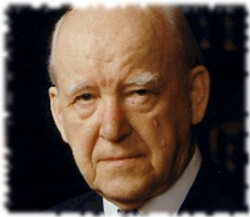Martyn Lloyd-Jones on the Altar Call
Martyn Lloyd-Jones on the Altar Call

(1899-1981, Welsh Protestant Minister)
We are to preach the Word, and if we do it properly, there will be a call to a decision that comes in the message, and then we leave it to the Spirit to act upon people.
Early in the 1970s Dr Martyn Lloyd-Jones was the speaker at a ministers’ conference in the USA and at a question session was asked the following question:
Question: During recent years, especially in England, among evangelicals of the Reformed faith, there has been a rising criticism of the invitation system as used by Billy Graham and others. Does Scripture justify the use of such public invitations or not?
Answer: Well, it is difficult to answer this in a brief compass without being misunderstood. Let me answer it like this: The history of this invitation system is one with which you people ought to be more familiar than anyone else, because it began in America. It began in the 1820s; the real originator of it was Charles G. Finney. It led to a great controversy. Asahel Nettleton, a great Calvinist and successful evangelist, never issued an “altar call” nor asked people to come to the “anxious seat.” These new methods in the 182Os and were condemned for many reasons by all who took the Reformed position.
One reason is that there is no evidence that this was done in New Testament times, because then they trusted to the power of the Spirit. Peter preaching on the Day of Pentecost under the power of the Spirit, for instance, had no need to call people forward in decision because, as you remember, the people were so moved and affected by the power of the Word and Spirit that they actually interrupted the preacher, crying out, “Men and brethren, what shall we do?” That has been the traditional Reformed attitude towards this particular matter. The moment you begin to introduce this other element, you are bringing a psychological element. The invitation should be in the message. We believe the Spirit applies the message, so we trust in the power of the Spirit. I personally agree with what has been said in the question. I have never called people forward at the end for this reason; there is a grave danger of people coming forward before they are ready to come forward. We do believe in the work of the Spirit, that He convicts and converts, and He will do His work. There is a danger in bringing people to a “birth,” as it were, before they are ready for it.
The Puritans in particular were afraid of what they would call “a temporary faith” or “a false profession.” There was a great Puritan, Thomas Shepard, who published a famous series of sermons on The Ten Virgins. The great point of that book was to deal with this problem of a false profession. The foolish virgins thought they were all right. This is a very great danger.
I can sum it up by putting it like this: I feel that this pressure which is put upon people to come forward in decision ultimately is due to a lack of faith in the work and operation of the Holy Spirit. We are to preach the Word, and if we do it properly, there will be a call to a decision that comes in the message, and then we leave it to the Spirit to act upon people. And of course He does. Some may come immediately at the close of the service to see the minister. I think there should always be an indication that the minister will be glad to see anybody who wants to put questions to him or wants further help. But that is a very different thing from putting pressure upon people to come forward. I feel it is wrong to put pressure directly on the will. The order in Scripture seems to be this – the truth is presented to the mind, which moves the heart, and that in turn moves the will.
Related Posts
- Altar Calls
Altar Calls "We have an altar" Hebrews 13:10 by Don Fortner Grace Baptist Church 2734…
- Why We Don't Use The Altar Call
Why We Don't Use The Altar Call By Laurence A. Justice An altar call…
- Why Don't We Have Altar Calls?
We don't have altar calls because God saves not by geographic location nor by relocation…
Christ Died For The Ungodly
by Horatius Bonar
The divine testimony concerning man is, that he is a sinner. God bears witness against him, not for him; and testifies that "there is none righteous, no, not one"; that there is "none that doeth good"; none "that understandeth"; none that even seeks after God, and, still more, none that loves Him (Psa. 14:1-3; Rom. 3:10-12). God speaks of man kindly, but severely; as one yearning over a lost child, yet as one who will make no terms with sin, and will "by no means clear the guilty." <continued>
- The Old Covenant Versus The New Covenant
- Why No Ex-Catholic Should Ever Come Home To Rome
- Why Catholics Are Wrong For Denying Assurance Of Salvation
- False Catholic Church Teaching About Apostolic Succession
- Go And Tell – An Article About Sharing Your Faith In Christ
- Are You Poor And Needy?
- Videos About Catholicism And Catholic Church History
- Bizarre Teachings Of The Roman Catholic Church Regarding Eucharists
- The Immaculate Conception Deception
- Mariology – Official Roman Catholic Position On The Person And Work Of The Virgin Mary
- The Catholic Jesus – A Fake Jesus (83,541)
- Famous Calvinists Of The Past & Present (78,451)
- Jesus Christ & The Pope Compared (77,033)
- What Is God’s Grace? (74,659)
- Mother Teresa – Where Is She Now? (72,820)




















Leave a Reply
You must be logged in to post a comment.